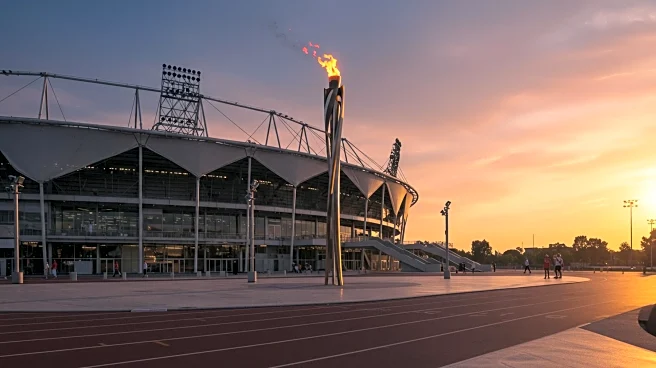What's Happening?
The Los Angeles Olympics organizing committee has announced plans to sell naming rights for several venues for the 2028 Games, marking a significant departure from the International Olympic Committee's (IOC) traditional policy of keeping brand names off its arenas and stadiums. This initiative is expected to generate millions of dollars in revenue, which will exceed the current $6.9 billion budget for the Games. The committee has already secured contracts with founding partners Honda and Comcast, who will have naming rights for the volleyball arena in Anaheim and the temporary squash venue, respectively. Casey Wasserman, chairman and CEO of LA28, emphasized the necessity of this move due to the lack of government funding for the Games, a common scenario for U.S.-hosted Olympics. Wasserman has been actively engaging with IOC members to explain the American sports culture where venue naming rights are commonplace.
Why It's Important?
This development is significant as it represents a shift in how the Olympics are funded and organized, particularly in the U.S. The decision to sell naming rights could set a precedent for future Games, potentially altering the financial landscape of the Olympics. By securing additional revenue streams, the Los Angeles committee aims to ensure the financial viability of the 2028 Games without relying on public funds. This move could benefit private enterprises and sponsors looking to associate their brands with a global event, while also providing a model for other cities considering hosting the Olympics. However, it may also raise concerns about commercialization and the potential impact on the traditional Olympic experience.
What's Next?
The organizing committee plans to offer naming rights for up to 19 temporary venues, with the IOC's top sponsors having the first opportunity to secure deals. However, iconic venues like the LA Coliseum, Rose Bowl, and Dodger Stadium will not be included in this arrangement. The committee will continue to negotiate with potential sponsors, ensuring that no venue is renamed unless a deal is reached. Additionally, the committee is making other significant changes, such as altering the traditional Olympic schedule by moving track and field events to the opening week and swimming to the end. These changes reflect Los Angeles' unique approach to hosting the Games and its influence on the Olympic brand.
Beyond the Headlines
The decision to sell naming rights highlights the evolving relationship between the IOC and host cities, particularly in the context of financial sustainability. As cities become increasingly hesitant to bear the costs of hosting the Olympics, innovative funding strategies like this one may become more common. This approach also underscores the growing influence of private entities in organizing large-scale international events, potentially leading to a more commercialized Olympic experience. The success of this initiative could encourage other host cities to explore similar strategies, potentially reshaping the future of the Olympics.








